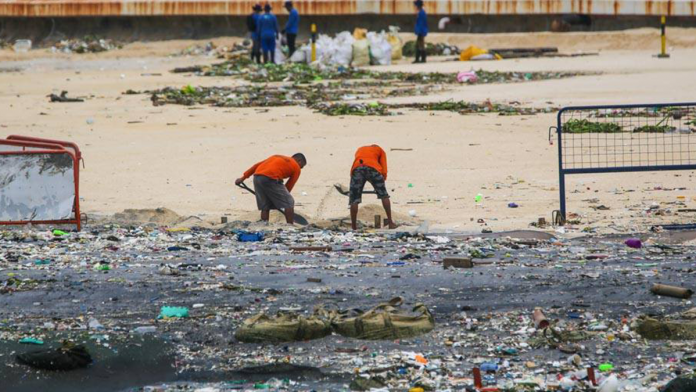
MANILA — Buhay party-list representative Lito Atienza on Sunday said that the waters of Manila Bay are now “several times filthier” compared to 22 years ago, when concerned residents first launched a civil action that eventually led to a Supreme Court order forcing 13 agencies to clean up the inlet.
“In contrast, based on the most recent water samples taken from major outfalls along Roxas Boulevard, fecal coliform counts now range anywhere from 11 million to 54 million MPN per ml,” Atienza said in a statement.
“We checked court records. Water samples taken from Manila Bay way back in 1999 showed fecal coliform counts of 50,000 to 80,000 most probable number (MPN) per milliliter (ml),” he added.
Atienza said that a very high fecal coliform count suggests the heavy presence of bacteria or viruses in the water that may cause diseases such as typhoid fever, viral and bacterial gastroenteritis and hepatitis A.
“This is really not surprising because up to now, of the 16.3 million water-served population in Metro Manila, only 15 percent or 2.4 million are connected to a sewerage system. Clearly, the bulk of Metro Manila’s household toilet waste continues to drain into waterways, including the Pasig River, that all empty out into the bay every day,” the lawmaker, who was also Manila City’s mayor, said.
“This proves our point that we have stop the uncontrolled outflow of human sewage if we truly want to decontaminate Manila Bay,” he added.
Atienza is citing the court records of the 1999 lawsuit filed by residents who claimed that the Metro Manila Development Authority and 12 other agencies neglected to protect and clean up the waters of Manila Bay.
The case reached the Supreme Court, which ruled in favor of the residents in 2008 and issued a continuing mandamus that required the agencies to rehabilitate the waters of the bay, he said.
“In a separate case, the Supreme Court in 2019 penalized Metro Manila’s two private water concessionaires and the Metropolitan Waterworks Sewerage System with P1.84 billion in combined fines due to their failure to connect households to a sewerage system and their lack of wastewater treatment facilities,” he said.
“Until they fully comply with the provisions of Clean Water Act, the three parties will have to pay a daily fine of P322,102 that escalates by 10 percent in two years, plus legal interest of six percent per annum.”
Atienza noted that the tribunal upheld the penalty imposed by him when he was secretary of environment and natural Resources in 2009.
The University of the Philippines Marine Science Institute earlier said that the rehabilitation of Manila Bay is an “arduous task” and effort should be exerted by both residents, people using the area, and the government. (ABS-CBN News)



